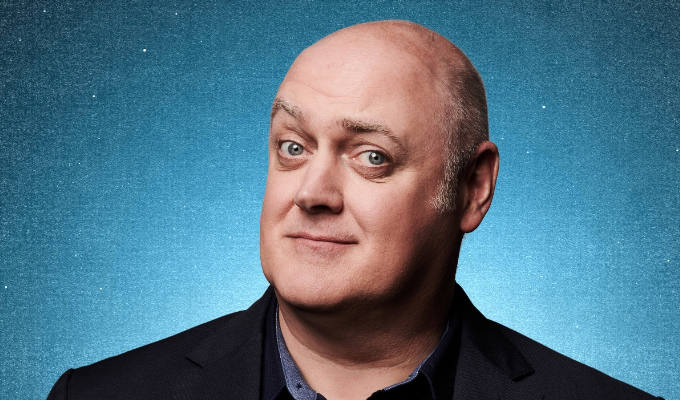Mack The Life by Lee Mack
Book review by Steve Bennett
One thing that strikes you about reading Lee Mack’s autobiography is how ordinary he is.
That might not strike you as a big selling point for a celebrity memoir, but it’s a key point as Mack always thought comedians were somehow ‘special people’, and that the rarefied world of stand-up, as seen on the glamorous telly, was closed to the likes of him.
That might be hard to conceive today, when the barrier to entering the profession is so low, with an open-mic night in every pub and almost as many ‘tutors’ imparting their version of how comedy should be done. But two decades ago, things were very different.
Mack always had an inkling he’d like to make people laugh for a living, but never thought it possible, so decided to concentrate on more achievable goals, like being a professional golfer, darts player or champion jockey. The latter led him to a job as a stable boy with legendary trainer Ginger McCain, where he got to ride Red Rum.
After a number of short-term jobs he wound up working in a bingo hall, and finally Pontin’s – showbiz at last. Although as the only blue coat without a drama degree, he was relegated to sideline roles. But it was at the camp in Hemsby, Great Yarmouth, where he got to perform a stand-up routine for the first time… and a star was born.
Well, not exactly. In his sweat-soaked panic, he told one audience member to ‘fuck off’ and called another a ‘cunt’ – and was soon back on the train back to his native Stockport. Another attempt at a career as a children’s entertainer ended in similar dignity; scenes of hilarious slapstick destruction worthy of the most inept comedy character.
Mack’s real awakening came in 1990, when he visited the Comedy Store, when he saw comedians off the telly in the actual, living flesh. Although he was still in awe of them, it opened his eyes to the possibility that this was a job people could actually do.
It prompted him to sign up to a film, theatre and drama degree at Brunel University, to get used to performing, and four years later he was ready to face his first gig, armed with some prop gags and a joke his mate told him which, ironically enough, turned out to have originally been written by his future Not Going Out co-star Tim Vine, as one heckler was quick to point out.
Like so many before him and since, those brief few minutes on stage were enough to get Mack hooked – and the fellow competitors he met at that original gong show introduced him to London’s open mic circuit, where he realised that all manner of people could call themselves comedians, and there was nothing inherently ‘special’ about those who broke into this world.
Perhaps as a consequence of his original preconceptions about the business, Mack is very pragmatic about the world of comedy, stressing that enduring success is largely down to hard graft, not magical inspiration or big breaks… it’s usually a slow, steady progress like any other career.
The result is a down-to-earth appraisal of how to get into comedy, with a healthy suspicion of TV folk and people who take the business too seriously. Aspiring stand-ups might be well advised to start here for an honest picture of what progress might be like.
In what might be seen as a drawback for an autobiography, Mack has never been one of those comics who mines their own life for material, preferring to make silly, meaningless jokes (although that’s almost as revealing about his personality in its own way as a stand-up who more explicitly wears their heart on their sleeve).
Even the fact he has a stage name – he was born Lee McKillop – helps separate the professional life from the personal. In the book, too, he wants to put some distance between himself and his feelings, so decided on the device of having a psychiatrist read through his chapters, then offer her opinion on what this tells us about Mack’s personality. What is telling is that the annotations he subsequently added far outweigh her professional opinion – showing that in true stand-up fashion, he has to have the last word.
‘I think there’s far too many comedians who talk about their personal issues,’ he tells her in the first session. ‘I just want it [the book] to be about getting into comedy.’ Job done.
It’s all part of his approach that comedy is career like any other, albeit much more rewarding, and, unlike some of his peers, he wants to enjoy a life away from it too. When Jimmy Carr, inspired by Sir Bruce Forsyth, told him how great it was that they were in a career which could continue into their seventies, it filled Mack with dread, He wants to be retired by then.
Mack The Life isn’t as evocative of life on the road as Frank Skinner’s first book, or as entertainingly insightful as Steve Martin’s Born Standing Up, but it’s still a cracking read. Jokes liberally dot the narrative, and you’re never more than a couple of paragraphs from the next smart-arse comment.
That sometimes comes at the expense of sincerity, but he generally gets the balance right to produce a frank picture of a man who can’t believe his luck, but still manages to keep his feet on the ground.
- Mack The Life has been published by Bantam Press, priced £18.99. Click here to order from Amazon at £10.99.
Published: 5 Oct 2012






